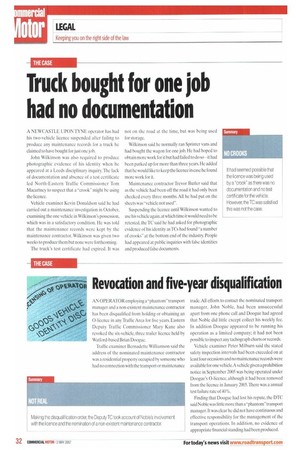Truck bought for one job had no documentation
Page 32

If you've noticed an error in this article please click here to report it so we can fix it.
A NEWCASTLE UPON TYNE operator has had his two-vehicle licence suspended after failing to produce any maintenance records for a truck he claimed to have bought for just one job.
John Wilkinson was also required to produce photographic evidence of his identity when he appeared at a Leeds disciplinary inquiry. The lack of documentation and absence of a test certificate led North-Eastern Traffic Commissioner Tom Macartney to suspect that a "crook" might be using the licence.
Vehicle examiner Kevin Donaldson said he had carried out a maintenance investigation in October, examining the one vehicle in Wilkinson's possession, which was in a satisfactory condition. He was told that the maintenance records were kept by the maintenance contractor. Wilkinson was given two weeks to produce them but none were forthcoming.
The truck's test certificate had expired. It was not on the road at the time, but was being used for storage.
Wilkinson said he normally ran Sprinter vans and had bought the wagon for one job. He had hoped to obtain more work for it but had failed to do so—it had been parked up for more than three years. He added that he would like to keep the licence in case he found more work for it.
Maintenance contractor Trevor Butler said that as the vehicle had been off the road it had only been checked every three months All he had put on the sheets was "vehicle not used".
Suspending the licence until Wilkinson wanted to use his vehicle again.at which time it would need to be retested, the Tc said he had asked for photographic evidence of his identity as TCs had found "a number of crooks" at the bottom end of the industry. People had appeared at public inquiries with false identities and produced false documents


























































































































































































